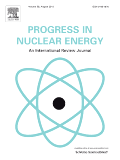
Progress in Nuclear Energy
Scope & Guideline
Transforming nuclear knowledge into practical solutions.
Introduction
Aims and Scopes
- Nuclear Reactor Design and Safety:
Focuses on the design principles of various types of nuclear reactors, including small modular reactors and advanced reactor systems, emphasizing safety protocols and risk assessment methodologies. - Thermal-Hydraulic Analysis:
Investigates the thermal-hydraulic behaviors within nuclear systems, including the performance of cooling systems, heat exchangers, and the dynamics of two-phase flow under various operational conditions. - Radiation Shielding and Materials:
Explores innovative materials and composites for radiation shielding, including studies on their mechanical and thermal properties, as well as their performance in nuclear environments. - Nuclear Fuel Cycle and Waste Management:
Covers topics related to the nuclear fuel cycle, including fuel fabrication, spent fuel management, and waste disposal strategies, highlighting advancements in recycling and waste minimization. - Neutronics and Reactor Physics:
Addresses the fundamentals of neutron transport, criticality safety, and reactor kinetics, providing insights into the behavior of nuclear systems under various operational scenarios. - Artificial Intelligence and Machine Learning Applications:
Examines the integration of AI and machine learning techniques in nuclear energy systems for predictive maintenance, fault diagnosis, and optimization of reactor operations. - Environmental and Societal Impact Studies:
Analyzes the environmental consequences of nuclear energy production, including public perception, regulatory challenges, and the socio-economic implications of nuclear technology.
Trending and Emerging
- Advanced Reactor Concepts:
There is a growing emphasis on innovative reactor designs, such as molten salt reactors and high-temperature gas-cooled reactors, which promise enhanced safety and efficiency. - Machine Learning and Digital Twins:
The application of machine learning techniques and the concept of digital twins for real-time monitoring, predictive maintenance, and optimization of nuclear systems are rapidly emerging as critical areas of research. - Sustainability and Environmental Impact Assessments:
Research is increasingly focused on the environmental impacts of nuclear energy, including lifecycle assessments and the role of nuclear energy in achieving carbon neutrality. - Accident Management and Safety Enhancements:
Emerging themes include advanced methodologies for accident management, safety analysis, and the development of passive safety systems that improve the resilience of nuclear facilities. - Hybrid Energy Systems:
Studies exploring the integration of nuclear energy with renewable sources, such as solar and wind, to create hybrid energy systems are gaining attention as a means to enhance energy security and sustainability.
Declining or Waning
- Traditional Thermal Reactor Technologies:
Research on conventional thermal reactors has decreased as focus shifts toward advanced and innovative reactor designs such as fast reactors and small modular reactors. - Single-Discipline Studies:
There is a noticeable trend away from isolated studies that focus on a single discipline (e.g., purely thermal-hydraulic or purely neutronics) towards more integrated, multidisciplinary approaches that combine various aspects of nuclear technology. - Conventional Radiation Shielding Materials:
The exploration of traditional shielding materials is declining in favor of novel composites and hybrid materials that offer improved performance and environmental benefits. - Historical Case Studies:
Research focused on historical nuclear incidents and case studies is becoming less frequent, as current studies prioritize predictive modeling and real-time safety assessments. - Basic Neutronics Calculations:
The frequency of basic neutronics calculations is waning as researchers increasingly employ advanced simulation tools and integrated approaches that combine neutronics with thermal-hydraulics.
Similar Journals
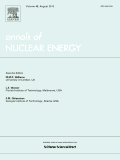
ANNALS OF NUCLEAR ENERGY
Shaping the Future of Sustainable Energy SystemsANNALS OF NUCLEAR ENERGY, published by Pergamon-Elsevier Science Ltd, is a premier interdisciplinary journal in the field of nuclear energy and engineering. Holding an impressive Q1 ranking in its category as per the 2023 evaluations, it is recognized for its significant contributions to the advancement of nuclear science and technology. With its extensive publication history since 1975 and a convergence period extending to 2025, the journal aims to disseminate high-quality research, innovative methodologies, and critical reviews that address the challenges and developments in nuclear energy systems. Though the journal does not offer open access options, it remains a vital resource for researchers, professionals, and students seeking to stay abreast of the latest trends and breakthroughs in this essential field. Its commitment to fostering academic discourse ensures that contributors and readers alike are engaged in shaping the future of energy solutions.

JOURNAL OF RADIOANALYTICAL AND NUCLEAR CHEMISTRY
Shaping the landscape of radiochemical innovation.JOURNAL OF RADIOANALYTICAL AND NUCLEAR CHEMISTRY, published by Springer, serves as a vital platform for the dissemination of research in the fields of analytical chemistry, nuclear science, and radiochemistry. With an ISSN of 0236-5731 and an E-ISSN of 1588-2780, this journal has been a beacon of innovation and scholarly communication since its inception, transitioning from converged years of 1977-1979 to its current continuity from 1984 to 2024. Positioned in the Q3 category for analytical chemistry and other related fields such as health, toxicology, and nuclear engineering, it boasts significant standings in the Scopus rankings, reflecting its relevance and impact within these disciplines. The journal emphasizes open access, encouraging broader accessibility to quality research, which is critical for students, professionals, and ongoing global scientific discussions. As a leader in its domain, the JOURNAL OF RADIOANALYTICAL AND NUCLEAR CHEMISTRY is committed to advancing the understanding of radioactive materials, environmental safety, and health applications, ensuring its readers remain at the forefront of emerging trends and discoveries.

ATW-INTERNATIONAL JOURNAL FOR NUCLEAR POWER
Illuminating Insights in Nuclear Power ApplicationsATW - International Journal for Nuclear Power is a premier journal dedicated to advancing the understanding and application of nuclear technology within the energy sector. Published by INFORUM Verlags-Verwaltungsgesellschaft mbH, this esteemed publication provides a platform for researchers, professionals, and students to disseminate cutting-edge research, practical applications, and critical analyses related to nuclear power generation. Although it has discontinued coverage in Scopus since 2012, its long-standing contributions to the field since 1996 underscore its significance and relevance. The journal aims to bridge the gap between theoretical insights and real-world applications, ensuring that stakeholders are well-informed on the latest trends, safety protocols, and innovations in nuclear power. With a commitment to fostering knowledge dissemination and collaboration, ATW continues to be an essential resource for anyone involved in the nuclear energy landscape.

ATOMIC ENERGY
Catalyzing collaboration in the nuclear research community.ATOMIC ENERGY is a distinguished journal published by SPRINGER, focusing on pivotal advancements and research within the field of Nuclear Energy and Engineering. With an ISSN of 1063-4258 and an E-ISSN of 1573-8205, this journal has been a critical resource since its inception in 1956, serving both historic and contemporary scientific inquiries into nuclear technologies. Currently positioned in Q3 of the Nuclear Energy and Engineering category, ATOMIC ENERGY ranks 49 out of 77 in Scopus, representing a percentile of 37%, highlighting its relevance in the research community. While it is not an open access journal, it continues to draw a diverse readership eager to engage with the latest findings and innovations in nuclear science. The journal’s objectives include fostering collaborative research, sharing expertise, and addressing contemporary challenges in nuclear energy. As such, ATOMIC ENERGY remains an essential platform for researchers, professionals, and students alike, contributing significantly to the ongoing dialogue in the field.
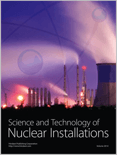
Science and Technology of Nuclear Installations
Unveiling Breakthroughs in Nuclear EngineeringScience and Technology of Nuclear Installations, published by HINDAWI LTD, is an esteemed scholarly journal specializing in the dynamic field of nuclear energy and engineering, with an ISSN of 1687-6075 and an E-ISSN of 1687-6083. Since transitioning to an Open Access model in 2007, the journal has significantly contributed to the dissemination of innovative research and practical applications in nuclear technology, attracting a global audience from both academia and industry. Based in Egypt, this prominent journal serves as a vital platform for researchers seeking to explore advanced methodologies, cutting-edge technologies, and the sustainable development of nuclear installations. Achieving a commendable Q2 category ranking in Nuclear Energy and Engineering and positioning at #35/77 in Scopus rankings (55th percentile) underscores its influential presence within the scientific community. With a publication horizon extending from 2008 to 2024, the journal remains committed to fostering collaboration and innovation in nuclear science, making it an invaluable resource for researchers, professionals, and students alike.

Radiation Detection Technology and Methods
Exploring Cutting-Edge Techniques in Radiation DetectionRadiation Detection Technology and Methods is a prominent academic journal published by Springer Singapore Pte Ltd, dedicated to advancing the field of nuclear and high-energy physics, as well as nuclear energy and engineering. Established in 2017, this journal provides a platform for the dissemination of pioneering research and innovative methodologies in radiation detection technology. As of 2023, it holds a commendable Q2 ranking in both the categories of Nuclear and High Energy Physics and Nuclear Energy and Engineering, underscoring its significance in fostering scholarly discourse within these vital fields. With ISSN 2509-9930 and E-ISSN 2509-9949, the journal aims to cater to a diverse audience of researchers, professionals, and students, emphasizing open access to knowledge. The journal's contributions are particularly crucial for those engaged in the development of safer and more efficient radiation detection techniques, ultimately bridging the gap between theory and practical applications in energy security and health physics. For researchers seeking a dedicated outlet for their work, Radiation Detection Technology and Methods represents an invaluable resource and an opportunity to influence the future of radiation science.
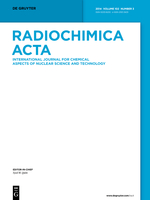
RADIOCHIMICA ACTA
Pioneering Research in Radioch Chemistry Since 1962RADIOCHIMICA ACTA, published by Walter de Gruyter GmbH, is a leading journal in the field of Physical and Theoretical Chemistry, with a storied history dating back to 1962. Based in Berlin, Germany, this esteemed journal serves as a vital platform for researchers, professionals, and students interested in the intricate interactions between radioactivity and chemical processes. With an impressive *Scopus rank* of 125 out of 189 and a *Category Quartile* ranking of Q3 for 2023, it is recognized for contributing significant findings to the scientific community. Although it currently does not provide open access options, RADIOCHIMICA ACTA continues to enrich the field through its commitment to disseminating high-quality research and critical reviews. As it converges toward its milestone year of 2024, the journal remains an essential resource for advancing knowledge in radioch Chemistry, shaping the future of theoretical explorations and practical applications alike.
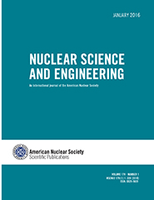
NUCLEAR SCIENCE AND ENGINEERING
Illuminating the Path of Nuclear AdvancementsNUCLEAR SCIENCE AND ENGINEERING, published by Taylor & Francis Inc, is a leading journal in the field of nuclear energy and engineering, providing a vital platform for disseminating cutting-edge research and advancements from both academia and industry. With an ISSN of 0029-5639 and an E-ISSN of 1943-748X, the journal boasts a notable impact factor and is categorized in the Q2 quartile for 2023, reflecting its influence and quality in the field. Covering a comprehensive scope from the inception of nuclear technology in 1969 to contemporary advancements forecasted for 2024, it ranks #38 out of 77 in the Scopus Energy – Nuclear Energy and Engineering category, placing it in the 51st percentile. Although the journal is not open access, it remains essential for researchers, professionals, and students seeking to stay abreast of the latest developments and innovations in nuclear science. Located in the heart of Philadelphia, NUCLEAR SCIENCE AND ENGINEERING contributes significantly to the advancement of nuclear engineering knowledge and practice, making it a crucial resource for anyone involved in this dynamic field.
Mechanical Engineering Journal
Exploring the forefront of mechanical engineering research.The Mechanical Engineering Journal, published by the Japan Society of Mechanical Engineers, serves as a premier platform for scholarly discourse in the field of mechanical engineering. With an ISSN of 2187-9745 and embracing an Open Access model since 2014, this journal fosters wide dissemination of research findings, ensuring that valuable insights are accessible to a global audience. The journal aims to bridge the gap between theoretical advancements and practical applications in mechanical engineering, making it a vital resource for researchers, industry professionals, and students alike. Located in the heart of Tokyo, Japan, this publication upholds the highest standards of academic integrity and innovation, contributing significantly to advancements in mechanical engineering and related disciplines. Stay abreast of powerful research that pushes the boundaries of technology and engineering applications by exploring the latest issues of this influential journal.
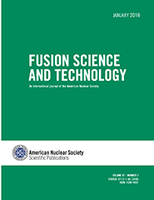
FUSION SCIENCE AND TECHNOLOGY
Advancing sustainable energy through innovative fusion research.FUSION SCIENCE AND TECHNOLOGY is a leading peer-reviewed journal published by Taylor & Francis Inc., dedicated to the advancement of knowledge in the fields of nuclear science, engineering, and fusion technology. With an impact factor that reflects its growing significance, this journal provides a platform for innovative research that addresses the challenges and opportunities within Civil and Structural Engineering, Materials Science, Mechanical Engineering, and Nuclear Energy and Engineering. Its open access option facilitates wider dissemination of groundbreaking research, enhancing visibility and accessibility for researchers, professionals, and students alike. As a member of the Q2 and Q3 Quartiles across various categories—demonstrating its reputable standing among peers—the journal plays a crucial role in fostering collaboration and sharing the latest scientific discoveries in fusion and related technologies from 2001 until 2024. This makes it an essential resource for anyone engaged in the multidisciplinary aspects of fusion science, contributing to the development of sustainable energy solutions.